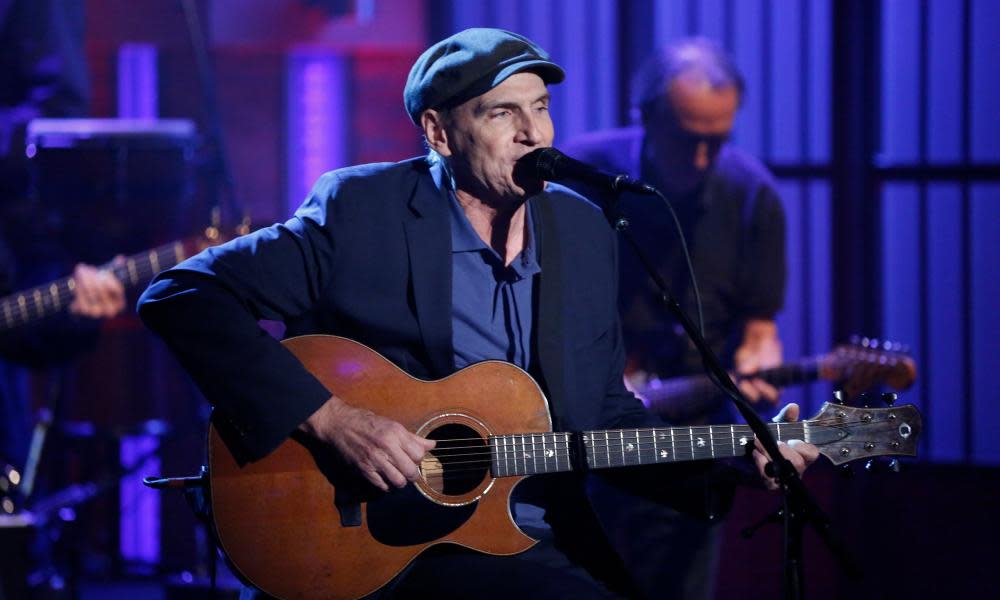James Taylor review – heartfelt songcraft saved from the brink of parody

It’s hard to imagine how the genial, gently wisecracking chap on stage could provoke anyone into thoughts of violence. However, in 1971, the singer-songwriter was the subject of Lester Bangs’s infamous essay, James Taylor Marked for Death, in which the legendary if rather livewire rock critic fantasised about murdering the artist with a beer bottle. Bangs compared Taylor (and Elton John) unfavourably with wilder heroes from Jerry Lee Lewis to the Troggs and argued that the emerging “troubadours” – purveyors of sensitive, personal songs – were narcissistic and the enemy of rock.
Bangs, of course, was dead at 33 and would probably chuckle at the irony that his old foe – a youthful 70 – is now playing arenas. Taylor’s fanbase includes Barack Obama, and his last album knocked Taylor Swift off the top of the US charts. Along the way, his intimate, slightly winsome style has inspired singer-songwriters from sometime duet partner Swift (who was even named after him) to Bon Iver. Meanwhile, in crazy 2018, there’s something reassuring and human about Taylor’s heartfelt themes of freedom, sweet homecomings and family values.
But there always was more to him than met the eye. He has been a psychiatric patient and a heroin addict, something he obliquely references here – “I can’t remember everything. I’m told I had a good time” – to knowing laughter. He tells of auditioning for Paul McCartney and George Harrison for his Apple Records deal and introduces Something in the Way She Moves with a tiny dash of vinegar. “George liked that one so much he went away and wrote it himself,” he quips, referring to the Beatles’ Something, quickly adding: “Of course, I learned everything from the Beatles in the first place.”
Musically too, Taylor has deeper waters. His songs smoothly tackle melancholy and death, and his superb band – whom he introduces with childlike glee (“and here’s a real legend on drums, Mr Steve Gadd!”) – run a genre spectrum of jazz, blues, soul and Latin dance. Taylor has been a vocal critic of President Trump, but here he keeps such thoughts to pointed lyrics such as Shed a Little Light’s, “Oh, Let us turn our thoughts today / To Martin Luther King / And recognise that there are ties between us.”
Of course, there are moments where you can almost hear Bangs revolving in his grave. Sunny Skies – a song about a dog, illustrated by footage of Taylor playing with one – edges towards self-parody, which Taylor cheerily acknowledges. Jimmy Jones’s Handy Man is accompanied by jokey films of DIY disasters. And yet, there are times – Don’t Let Me Be Lonely Tonight, Carole King’s You’ve Got a Friend, or the exquisite Fire and Rain, written about childhood friend Suzanne Schnerr’s suicide and still sung with tender anguish – where you fear someone will cry.
He unexpectedly reveals his inner rocker with a blast through Chuck Berry’s Johnny B Goode with opening act Bonnie Raitt. Two years Taylor’s junior, she has had health problems lately, and their warm duet on Taylor’s 1971 You Can Close Your Eyes, about how love and songs will outlast us, is telling and touching. Raitt is halfway to the dressing room before Taylor notices and fetches her back so she can take part in the bows and enjoy the rapturous applause. Sometimes, there’s no shame in being nice.
At SSE Hydro, Glasgow, on 10 July. Then touring.

 Yahoo News
Yahoo News 
